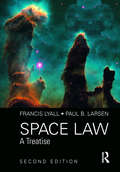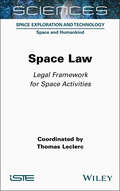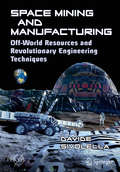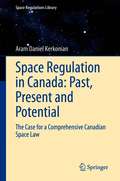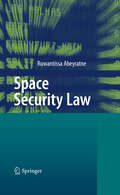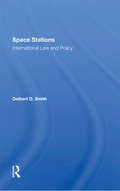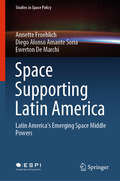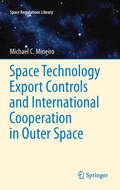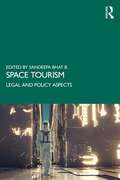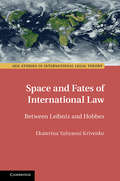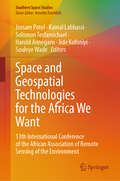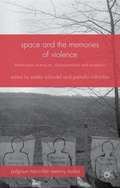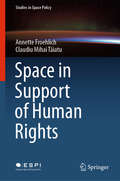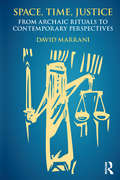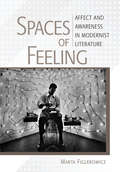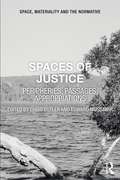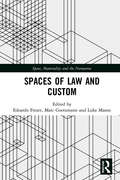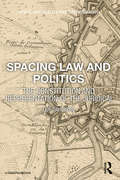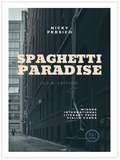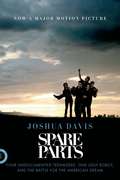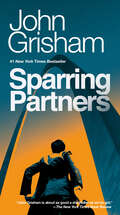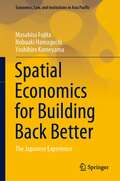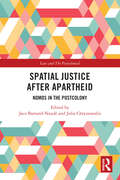- Table View
- List View
Space Law: A Treatise 2nd Edition (Library Of Essays In International Law Ser.)
by Francis Lyall Paul B. LarsenFrancis Lyall and Paul B. Larsen have been involved in teaching and researching space law for over 50 years. This new edition of their well-received text gathers together their knowledge and experience in readable form, and covers developments in all space applications, including space tourism, telecommunications, the ITU and finance. With an extensive citation of the literature, the discussion provides an excellent source for both students and practitioners.
Space Law: Legal Framework for Space Activities
by Thomas LeclercOuter space is subject to a legal framework; there is a set of rules specifically dedicated to outer space and to the activities carried out there. These rules have developed since 1957, the year the first artificial satellite was launched. Major changes have also affected the technology used and the actors involved, as well as the domains concerned by the exploration and use of outer space. Space Law will lay out the progressive densification of the legal framework that is applicable to outer space and the activities that are carried out there. Without claiming to be exhaustive, the aim of this book is to present the main primary sources of space law, its main principles, the diversity of its fields of application and the challenges and issues that the development of space activities inevitably raises.
Space Mining and Manufacturing: Off-World Resources and Revolutionary Engineering Techniques (Springer Praxis Books)
by Davide SivolellaThis book produces convincing evidence that exploiting the potential of space could help solve many environmental and social issues affecting our planet, such as pollution, overcrowding, resource depletion and conflicts, economic inequality, social unrest, economic instability and unemployment. It also touches on the legal problems that will be encountered with the implementation of the new technologies and new laws that will need to be enacted and new organizations that will need to be formed to deal with these changes.This proposition for a space economy is not science fiction, but well within the remit of current or under development technologies. Numerous technologies are described and put together to form a coherent and feasible road map that, if implemented, could lead humankind towards a brighter future.
Space Regulation in Canada: The Case for a Comprehensive Canadian Space Law (Space Regulations Library #12)
by Aram Daniel KerkonianSpace is no longer the domain of national space agencies. Today, a significant majority of space activities are carried out by non-governmental entities, resulting in the accelerated evolution of space technologies and their applications. This operational shift from public to private does not mean, however, that governments are no longer relevant in this era of New Space. On the contrary: as the operational role of the state has diminished, its regulatory role has grown correspondingly. Acknowledging that the commercial landscape in space is an ever-changing one, this book explores how the Canadian government has adapted to the new commercial space landscape and whether it is prepared to fulfil its authorisation and supervision responsibilities as the regulator of Canada’s space industry. The fundamental research question posed, therefore, is whether Canada’s regulatory framework is appropriate given the increasing commercialisation of space. To best answer this question, the book provides a doctrinal analysis of Canada’s historical space policy and current space laws, an empirical survey of the perspectives of those currently interacting with Canada’s regulatory framework, and a comparative exploration of how other jurisdictions oversee commercial space activities. Motivated by legal, moral and economic considerations, the book recommends that Canada enact a comprehensive national space law and provides an annotated draft law for this purpose. By doing so, the book intends to spark a meaningful conversation on how Canada ought to fulfil its regulatory responsibilities, a topic previously unaddressed in public and academic discourse.
Space Security Law
by Ruwantissa AbeyratneAgainst the variegated background of bewilderment and cautious optimism that space transportation offers, this book begins with an exposé on international politics, the principles of which, bear upon space transportation, as well as the closeness of air space and outer space, and activities that straddle both frontiers at the same time. It discusses current issues and possibilities of communications and transportation in outer space, as well as the liabilities and accountability of the key players of space exploration.
Space Security and Legal Aspects of Active Debris Removal (Studies in Space Policy #16)
by Annette FroehlichThe book analyzes the various legal and political concepts to resolve the problem of the existing space debris in outer space and which measures have been taken to avoid space debris or to reduce potential space debris in the course of future space missions. From a scientific and technical point of view various studies are ongoing to analyze the feasibility of active debris removal. Nevertheless it has to be highlighted that outer space is an international area where various actors with different legal and political concepts are operating, a situation that leads to different approaches concerning such activities.
Space Stations: International Law And Policy
by Delbert D. SmithThis book explores the international law and policy relating to space stations in terms of specific barriers to utilization and considers methods or policies designed to overcome perceived barriers. It deals with the institutional possibilities and alternatives for space station ownership.
Space Supporting Latin America: Latin America's Emerging Space Middle Powers (Studies in Space Policy #25)
by Annette Froehlich Diego Alonso Amante Soria Ewerton De MarchiThis book examines the background and context of Latin America's political and socioeconomic landscape with a focus on space activities. Firstly, it discusses Latin America's contribution to this sector from an international relations perspective, and explores the debates around the establishment of a Latin American Space Agency. It then highlights space-related capacity building, Latin America’s participation in UNCOPUOS, and international space activities, agreements, and initiatives in Latin America. The second part is devoted to the national space infrastructures and space activities of Latin American states. It analyzes various spacefaring countries in the context of their intra-regional space relations and initiatives as well as their bi-lateral cooperation programs. This timely book is of interest to scholars and professionals working in the space field, especially those in Latin America and other emerging countries.
Space Technology Export Controls and International Cooperation in Outer Space
by Michael MineiroExport controls definitively impact international cooperation in outer space. Civil and commercial space actors that engage in international endeavors must comply with space technology export controls. In the general discourse, members of the civil and commercial space community have an understanding of their domestic export control regime. However, a careful reading of the literature on space technology export controls reveals that certain questions relevant to international engagements have not been identified or answered. What is the legal-political origin of space technology export controls? How do they relate to the current international legal structure? What steps can be taken to evolve our current unilateral paradigm of space technology within the context of peaceful exploration and use of outer space? In this book, these and other relevant questions on space technology export controls are identified and assessed through an insightful case-study of the U.S. commercial communication export control regime. The findings of this case-study are used in an international legal-political analysis of international space law, public international law, and international cooperation. Breaking new ground in international legal theory, a self-justified security dilemma that is manifest in international law is identified and explained as the origin for the current paradigm of space technology export controls.
Space Tourism: Legal and Policy Aspects
by Bhat B. SandeepaSpace tourism has become extremely significant in recent times, especially in pursuance of the new space race among corporate giants such as Virgin Galactic, Blue Origin and SpaceX. Each of these corporate giants has already booked thousands of space enthusiasts for a journey to outer space. Given this wide interest of private space players, space tourists as well as countries in space tourism, it is imperative to understand the legal issues involved in space tourism. This book presents important discussions in the domain of space tourism and its legal implications across the globe. It attempts to find solutions to various challenges like safety and security in space, status of space tourists during emergencies, liability aspects, environmental protection, etc., faced during the recent spurt of space tourism. It also discusses the role of insurance in space tourism, various crimes possible in outer space with the rise of space tourism, the mechanisms for adjudication of such crimes, the aspect of quarantining space tourists, the need to preserve the natural and cultural heritage of space and other topics, besides examining the contemporary legal and policy-oriented issues of privatisation of space. A must read for scholars and researchers of law, space science, history and other fields who are interested in the space race and outer space law, this book will also be of interest to those exploring space studies, political studies, environmental studies and political economy. It will be useful for policymakers, bureaucrats, think tanks as well as interested general readers looking for fresh perspectives on the future of space
Space and Fates of International Law: Between Leibniz and Hobbes (ASIL Studies in International Legal Theory)
by Ekaterina Yahyaoui KrivenkoThe book offers the first analysis of the influence exercised by the concept of space on the emergence and continuing operation of international law. By adopting a historical perspective and analysing work of two central early modern thinkers – Leibniz and Hobbes – it offers a significant addition to a limited range of resources on early modern history of international law. The book traces links between concepts of space, universality, human cognition, law, and international law in these two early modern thinkers in a comparative fashion. Through this analysis, the book demonstrates the dependency of the contemporary international law on the Hobbesian concept of space. Although some Leibnizian elements continue to operate, they are distorted. This continuing operation of Leibnizian elements is explained by the inability of international law, which is based on the Hobbesian concept of space, to ensure universality of its normative foundation.
Space and Geospatial Technologies for the Africa We Want: 13th International Conference of the African Association of Remote Sensing of the Environment (Southern Space Studies)
by Souleye Wade Jossam Potel Kamal Labbassi Solomon Tesfamichael Harold Annegarn Jide KufoniyiThis book comprises the contributions of the African Association of Remote Sensing of the Environment (AARSE) international conference which is conducted biennially across Africa, alternately with the AfricaGIS conference. It is the premier forum in Africa for research on remote sensing technologies and geospatial information science, gathering leading scholars from the remote sensing and related communities. The 13th AARSE International Conference was held on October 24-28, 2022 in Kigali, Rwanda, to focus on Earth observations and geospatial science to achieve the Sustainable Development Goals. The five-day event themed “Space and Geospatial Technologies for the Africa We Want” was organized by the African Association of Remote Sensing of the Environment (AARSE) and the Institut d’Enseignement Supérieur de Ruhengeri (Ines-Ruhengeri) in partnership with Rwanda Space Agency and Space in Africa. Furthermore, the conference was sponsored by GMES and Africa, the Regional Centre For Mapping Of Resources For Development (RCMRD), Airbus, European Space Agency (ESA), Digital Earth Africa, and INES-Ruhengeri and Rwanda Space Agency. The 13th Conference continues a long series of successful AARSE conferences which started in 1996, in Harare (Zimbabwe), and has been held in Abidjan (Cote D'Ivoire) in 1998, Cape Town (South Africa) in 2000, Abuja (Nigeria) in 2002, Nairobi (Kenya) in 2004, Cairo (Egypt) in 2006, Accra (Ghana) in 2008, Addis Abeba (Ethiopia) in 2010, El Jadida (Morocco) in 2012, Johannesburg (South Africa) in 2014, Kampala (Ouganda) in 2016, and in Alexandria (Egypt) in 2018. The book is mainly addressed to practitioners and experts from academia, politics, and industry.
Space and the Memories of Violence
by Estela Schindel Pamela ColomboAuthors from a variety of disciplines dealing with diverse historical cases engage with the spatial deployment of violence and the possibilities for memory and resistance in contexts of state sponsored violence, enforced disappearances and regimes of exception. Contributors include Aleida Assmann, Jay Winter and David Harvey.
Space in Support of Human Rights (Studies in Space Policy #23)
by Annette Froehlich Claudiu Mihai TăiatuThis book stems from the worrying scale and intensity of conflicts, humanitarian crises, and human rights violations around the world, which can be seen in a wide range of global hotspots including Venezuela, Yemen, Syria, Myanmar, Sudan, Eritrea, and numerous others. These developments are also relevant for Europe, given the large-scale migrations they can produce. In order to effectively respond to them, it has become imperative to analyse ways in which space data and technologies can be used to uphold human rights and monitor violations. Various international tribunals, such as the International Court of Justice (ICJ) and the International Criminal Court (ICC), are increasingly relying on satellite data and especially images when considering human rights violations cases. This use of space-related technologies represents a trend that promises to continue as the range and accuracy of space-derived data improves. Further, satellite data has important legal implications because it allows the fulfilment of international obligations to be monitored, and offers a powerful tool for dispute resolution. Accordingly, this book examines the use of satellite images for cases concerning human rights violations, since the multitude of humanitarian crises worldwide demonstrate that it is of the utmost importance to analyse how space law, policies and space-related applications could further support the implementation and monitoring of the observance of human rights, thus contributing to enhanced security and sustainable development. A range of relevant areas, such as migration, refugees (including settlements and whether they are adequately supplied with basic necessities), water distribution and quality, housing and settlement monitoring are crucial aspects addressed in this book. In closing, the use of satellite data for legal purposes is not without its fair share of problems and concerns, which are also considered to guide the evolution of this emerging field.
Space, Time, Justice: From Archaic Rituals to Contemporary Perspectives
by David MarraniThis book merges philosophical, psychoanalytical and legal perspectives to explore how spaces of justice are changing and the effect this has on the development of the administration of justice. There are as central themes: the idea of transgression as the starting point of the question of justice and its archaic anchor; the relation between spaces of justice and ritual(s); the question of use and abuse of transparency in contemporary courts; and the abolition of the judicial walls with the use of cameras in courts. It offers a comparative approach, looking at spaces of justice in both the civil and common law traditions. Presenting a theoretical and interdisciplinary study of spaces of justice, it will appeal to academics in the fields of law, criminology, sociology and architecture.
Spaceports in Europe (Studies in Space Policy #34)
by Annette FroehlichThis book explores how Europe is seeking to enlarge its launching capacities by building additional spaceports on the European continent. Various national initiatives are envisaged resulting in a “space race” in the field of constructing spaceports and building micro launchers. However, right from the beginning when choosing the launch site (land or sea based-rocket launches) there are various factors relating to international space law, European regulations and national rules that must be considered, as spaceports are rarely explicitly addressed in current legal and policy frameworks. While launching sites used to be operated by governments, private commercial initiatives are increasingly entering the field. This paradigm shift must be reflected within regulations relating to various aspects of space liability by enlarging the long-established terms of the United Nations space treaties to accommodate commercial space flights. Questions of permission, supervision and control require special liability regulations to avoid detrimental consequences stemming from the concept of “launching states” in view of the rise of private driven commercial space activities on a global level. Furthermore, not only do environmental aspects need to be thoroughly examined but also the concept of critical infrastructure requires special attention from a security perspective to anticipate, inter alia, cyber-attacks. For these reasons, several European and national regulations may need to be enlarged to apply to the entire space sector, using a harmonized approach that has direct implications for the regulations, programmes, and missions of the European Union and the European Space Agency, bearing in mind that the upcoming spaceports in Europe are an essential asset to substantially boost the European New Space.
Spaces of Feeling: Affect and Awareness in Modernist Literature
by Marta FiglerowiczCan other people notice our affects more easily than we do? In Spaces of Feeling, Marta Figlerowicz examines modernist novels and poems that treat this possibility as electrifying, but also deeply disturbing. Their characters and lyric speakers are undone, Figlerowicz posits, by the realization that they depend on others to solve their inward affective conundrums—and that, to these other people, their feelings often do not seem mysterious at all.Spaces of Feeling features close readings of works by Virginia Woolf, James Baldwin, John Ashbery, Ralph Ellison, Marcel Proust, F. Scott Fitzgerald, Sylvia Plath, and Wallace Stevens. Figlerowicz points out that these poets and novelists often place their protagonists in domestic spaces—such as bedrooms, living rooms, and basements—in which their cognitive dependence on other characters inhabiting these spaces becomes clear. Figlerowicz highlights the diversity of aesthetic and sociopolitical contexts in which these affective dependencies become central to these authors' representations of selfhood. By setting these novels and poems in conversation with the work of contemporary theorists, she illuminates pressing and unanswered questions about subjectivity.
Spaces of Justice: Peripheries, Passages, Appropriations
by Chris Butler and Edward MussawirThis collection is inspired by the transdisciplinary possibilities posed by the connections between space and justice. Drawing on a variety of theoretical influences that include Henri Lefebvre, Gilles Deleuze and Felix Guattari, Doreen Massey, Gillian Rose, Walter Benjamin, Elias Canetti, Antonio Negri and Yan Thomas, the contributors to this book conduct a series of jurisprudential, aesthetic and political inquiries into ‘just’ modes of occupying space, and the ways in which space comes under the signs of law and justice. Bringing together leading critical legal scholars with theorists and practitioners from other disciplines within the humanities, Spaces of Justice investigates unexplored associations between law and architectural theory, the visual arts, geography and cultural studies. The book contributes to the ongoing destabilisation of the boundaries between law and the broader humanities and will be of considerable interest to scholars and students with an interest in the normative dimensions of law’s ‘spatial turn’.
Spaces of Law and Custom
by Edoardo FrezetThis collection brings together a carefully curated selection of researchers from law, sociology, anthropology, philosophy, history, social ontology and international relations, in order to examine how law and custom interact within specific material and spatial contexts. Normativity develops within these contexts, while also shaping them. This complex relationship exists within all physical places from traditional agrarian spaces to the modern shifting post-industrial workplace. The contributions gathered together in this volume explore numerous examples of such spaces from different disciplinary perspectives to interrogate the dynamic relationship between custom and law, and the material spaces they inhabit. While there are a dynamic series of conclusions regarding this relationship in different material realities, a common theme is pursued throughout: a proper understanding of law and custom stems from their material locatedness within the power dynamics of particular spaces, which, in turn, are reflexively shaped by that same normativity. The book thus generates an account of the locatedness of law and custom, and, indeed, of custom as a source of law. In this way, it provides a series of linked explorations of normative spaces, but, more fundamentally, it also furnishes a cross-disciplinary toolkit of concepts and critical tools for understanding law and custom, and their relationship. As the diversity of the contributors indicates, this book will be of great interest to legal theorists of different traditions, also legal historians and anthropologists, as well as sociologists, historians, geographers and developmental economists.
Spacing Law and Politics: The Constitution and Representation of the Juridical
by Leif DahlbergExamining the inherent spatiality of law, both theoretically and as social practice, this book presents a genealogical account of the emergence and the development of the juridical. In an analysis that stretches from ancient Greece, through late antiquity and early modern and modern Europe, and on to the contemporary courtroom, it considers legal and philosophical texts, artistic and literary works, as well as judicial practices, in order to elicit and document a series of critical moments in the history of juridical space. Offering a more nuanced understanding of law than that found in traditional philosophical, political or social accounts of legal history, Dahlberg forges a critical account of the intimate relations between law and politics that shows how juridical space is determined and conditioned in ways that are integral to the very functioning – and malfunctioning – of law.
Spaghetti Paradise
by Nicky PersicoA practicing lawyer, Alessandro Flachi, inexperienced and also a little clumsy, finds himself involved in the defense of two very different women in terms of age and social background, who share the fact that they are both victims of violence. From here, spiced up with intriguing culinary mixtures, a dense web of stories and people who, amidst suspense and moments of serenity, enter into the phenomenon of stalking and manipulation through a series of events that are destined to reveal unpredictable realities. In a Puglia that is always fascinating Puglia the story is told in a way that is extremely original, Nicky Persico leads the reader by the hand into a world of dangerous individuals - invisible enemies yet under the eyes of all, envious of the life and vitality of the victims they persecute – it proposes the recipe that its protagonist has devised to transform trivial ingredients into a philosophy of life: Spaghetti Paradise.
Spare Parts: Four Undocumented Teenagers, One Ugly Robot, and the Battle for the American Dream, First Edition
by Joshua DavisJoshua Davis's Spare Parts is a story about overcoming insurmountable odds and four young men who proved they were among the most patriotic and talented Americans in this country even as the country tried to kick them out.
Sparring Partners: Novellas (Jake Brigance #4)
by John Grisham#1 NEW YORK TIMES BESTSELLER • John Grisham is the acknowledged master of the legal thriller. In his first collection of novellas, law is a common thread, but America&’s favorite storyteller has several surprises in store. &“Homecoming&” takes us back to Ford County, the fictional setting of many of John Grisham&’s unforgettable stories. Jake Brigance is back, but he&’s not in the courtroom. He&’s called upon to help an old friend, Mack Stafford, a former lawyer in Clanton, who three years earlier became a local legend when he stole money from his clients, divorced his wife, filed for bankruptcy, and left his family in the middle of the night, never to be heard from again—until now. Now Mack is back, and he&’s leaning on his old pals, Jake and Harry Rex, to help him return. His homecoming does not go as planned.In &“Strawberry Moon,&” we meet Cody Wallace, a young death row inmate only three hours away from execution. His lawyers can&’t save him, the courts slam the door, and the governor says no to a last-minute request for clemency. As the clock winds down, Cody has one final request. The &“Sparring Partners&” are the Malloy brothers, Kirk and Rusty, two successful young lawyers who inherited a once prosperous firm when its founder, their father, was sent to prison. Kirk and Rusty loathe each other, and speak to each other only when necessary. As the firm disintegrates, the resulting fiasco falls into the lap of Diantha Bradshaw, the only person the partners trust. Can she save the Malloys, or does she take a stand for the first time in her career and try to save herself?By turns suspenseful, hilarious, powerful, and moving, these are three of the greatest stories John Grisham has ever told. Don&’t miss John Grisham&’s new book, THE EXCHANGE: AFTER THE FIRM!
Spatial Economics for Building Back Better: The Japanese Experience (Economics, Law, and Institutions in Asia Pacific)
by Masahisa Fujita Nobuaki Hamaguchi Yoshihiro KameyamaThe central theme of this book is national land and infrastructure design in the age of the declining population and the recovery from the Great East Japan Earthquake in the affected regions in Japan. Based on the theory of spatial economics and evidence from Japanese history, the authors show that the growing economy with a population increase develops into a multi-cored and complex structure. In the population decline phase, however, such construction will be destabilized because of agglomeration economies in the central core. Then, a catastrophic shock that strikes may provoke the decline of the lower-rank-size provincial cities and their eventual disappearance if they compete only in lower prices of staple products. Not only is the practice bad for the residents; it also leads to lower national welfare resulting from the loss of diversity and overcrowded big cities. The authors argue that small local towns can recover and will be sustained if they will endeavor in innovative production by making good use of local natural resources and social capital. Under the ongoing declining population in Japan, an undesirable concentration in Tokyo will proceed further with increasing social cost and risk. The recent novel coronavirus pandemic has highlighted that concern.
Spatial Justice After Apartheid: Nomos in the Postcolony (Law and the Postcolonial)
by Jaco Barnard-Naudé and Julia ChryssostalisThis book considers the question of spatial justice after apartheid, from several disciplinary perspectives – jurisprudence, law, literature, architecture, photography and psychoanalysis are just some of the disciplines engaged here. However, the main theoretical device on which the authors comment is the legacy of what in Carl Schmitt’s terms is nomos as the spatialised normativity of sociality. Each author considers within the practical and theoretical constraints of their topic, the question of what nomos in its modern configuration may or may not contribute to a thinking of spatial justice after apartheid. On the whole, the collection forces a confrontation between law’s spatiality in a "postcolonial" era, on the one hand, and the traumatic legacy of what Paul Gilroy has called the "colonial nomos", on the other hand. In the course of this confrontation, critical questions of continuation, extension, disruption, and rewriting are raised and confronted in novel and innovative ways that both challenge Schmitt’s account of nomos and affirm the centrality of the constitutive relation between law and space. The book promises to resituate the trajectory of nomos, while considering critical instances through which the spatial legacy of apartheid might at last be overcome. This interdisciplinary book will appeal to scholars of critical legal theory, political philosophy, aesthetics and architecture.
